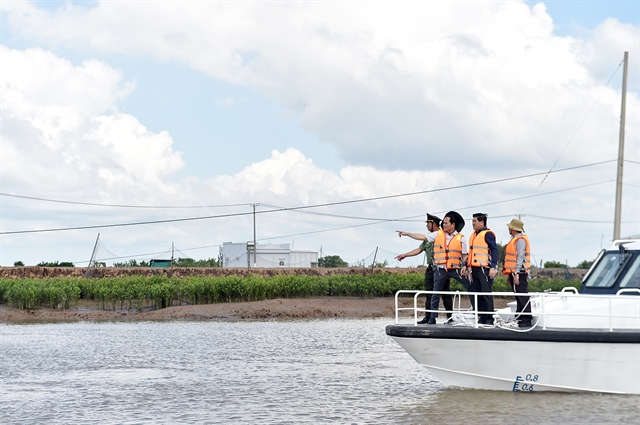 |
| Deputy Prime Minister Trần Lưu Quang inspects the erosion situation in Bạc Liêu and Cà Mau provinces on Sunday. — Photo from the Việt Nam Government Portal |
BẠC LIÊU — Deputy Prime Minister Trần Lưu Quang on Sunday led a central government delegation to survey sea dikes and inspect the escalating erosion situation in two Mekong Delta provinces – Bạc Liêu and Cà Mau.
At the working session, Chairman of Bạc Liêu Province People’s Committee Phạm Văn Thiều stated that over the past decade, Bạc Liêu has experienced soil erosion and subsidence in riverbank and East Sea (internationally known as the South China Sea) dike areas every year.
In 2023 and early 2024, the situation has become notably more severe.
Bạc Liêu Province currently has 77 riverbank erosion-affected areas and six coastal erosion-affected areas, with a total erosion length of nearly 600km. The province has identified 50 project categories requiring investment by 2030, with an estimated total cost of VNĐ28 trillion (US$1.115 billion).
Bạc Liêu Province proposed that the Prime Minister and the Ministry of Planning and Investment consider providing VNĐ3.436 trillion in budget support for it to carry out projects in five critical erosion areas and to combat tidal waves and protect production over a total length of 79.674km.
Deputy Chairman of Cà Mau Province People’s Committee Lê Văn Sử reported that the total length of particularly dangerous and dangerous coastal erosion sections is 83.85km. Specifically, the western sea coast is experiencing dangerous erosion over a length of 22km and the eastern sea coast is facing particularly dangerous erosion over a length of 61.85km
There are 355 erosion points along the river banks in the province, with 82 of them being severely eroded, affecting a total area of 3,724ha.
In the 2023-24 dry season, Sử remarked that due to the lack of water, prolonged droughts had caused fresh water shortages for daily life, production and fire prevention in northern Cà Mau, with some areas facing significant difficulties in accessing drinking water.
The dry conditions in rivers and canals have affected waterway transportation and the loss of water pressure on canals, leading to severe erosion, subsidence and road damages.
Furthermore, the difference in tidal amplitude between the inside and outside of the freshwater zone poses a risk of damaging hydraulic structures.
Regarding funds for addressing erosion, the official stated that Cà Mau is urgently finalising a project to combat riverbank and coastal erosion for the 2021-30 period, with an orientation towards 2050, based on feedback to be submitted to the PM for approval.
As the province most severely affected by climate change compared to other provinces in the region and the country, Cà Mau hopes that the Government leader, central ministries and agencies will provide guidance for the approval of the project and support resources to implement erosion prevention measures.
In the immediate term, Cà Mau Province requests central ministries and agencies to allocate funds to address particularly dangerous coastal erosion points along the East Sea coast, with an emergency situation declared for a length of 21.55km and an estimated cost of VNĐ1.693 trillion ($67.4 million), as well as some particularly dangerous riverbank erosion points with a total length of 5.7km and a total cost of VNĐ684 billion.
Deputy Minister of Agriculture and Rural Development Nguyễn Hoàng Hiệp noted that with worsening erosion in the area, the ministry is developing a project to combat erosion, subsidence and saltwater intrusion and is gathering feedback from localities.
The project will include solutions related to both infrastructure and non-infrastructure measures, as well as capital and policy mechanisms.
The ministry’s stance is to definitively address coastal erosion in the western region, including Kiên Giang and Cà Mau.
Deputy Minister of Planning and Investment Đỗ Thành Trung stressed that erosion prevention must be addressed with fundamental solutions rather than makeshift investments that only happen after disasters occur.
In his concluding remarks, Deputy PM Quang expressed sympathy for the difficulties faced by localities grappling with natural disasters such as erosion and subsidence.
The Mekong Delta region is considered sensitive and vulnerable to climate change, therefore, ministries, agencies and provinces need to approach the issue with a comprehensive, fundamental and long-term perspective, Deputy PM said.
Quang highlighted the importance of forecasting erosion as early and accurately as possible, stating that while this task may not require significant financial resources, poor implementation could result in severe damage, including loss of life.
He urged authorities to focus on relocating people from erosion-prone areas, ensuring their livelihoods.
Regarding investment funds, Quang stressed the need to adhere to principles, prioritise projects based on urgency and address the most critical ones first. — VNS
- Reduce Hair Loss with PURA D’OR Gold Label Shampoo
- Castor Oil Has Made a “Huge” Difference With Hair and Brow Growth
- Excessive hair loss in men: Signs of illness that cannot be subjective
- Dịch Vụ SEO Website ở Los Angeles, CA: đưa trang web doanh nghiệp bạn lên top Google
- Nails Salon Sierra Madre
 VnExpress News The News Gateway of Vietnam
VnExpress News The News Gateway of Vietnam





